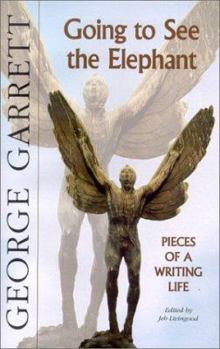Going to See the Elephant: Pieces of a Writing Life
Select Format
Select Condition 
Book Overview
"Going to See the Elephant is a safari into the wilds of the mind of George Garrett, and a more interesting place to explore is hard to imagine. Whether he (or his beleaguered alter-ego, John Towne) is examining the writing life, tipping his hat to other writers, or fulminating about the sorry state of the world we live in, he is well worth a listen - both for the sheer pleasure of it and for the wisdom to be found in it." --R.H.W. Dillard,...
Format:Paperback
Language:English
ISBN:1881515427
ISBN13:9781881515425
Release Date:May 2002
Publisher:Texas Review Press
Length:200 Pages
Weight:0.80 lbs.
Dimensions:0.7" x 5.5" x 8.5"
Customer Reviews
2 ratings
Garrett Rises
Published by Thriftbooks.com User , 16 years ago
George Garrett: Going to See the Elephant: Pieces of a Writing Life. Edited by Jeb Livingood. Huntsville: Texas Review Press, 2002. 195 pp. George Garrett, retired from the University of Virginia, earned status as a Practicing Prince of Southern Letters, crowned by awards for novels, stories, poems, and essays, and has influenced American Letters now for decades. While not a Texan, his second book The Sleeping Gypsy and Other Poems was published in 1958 by the University of Texas Press, before his 30th birthday. He continued his Texas associations. These essays on his life and other writers range from Caedmon to Fitzgerald, Welty, Dickey, Chappell, Capote and their ilk, and on to modern academic cowboy and Indian shoot-outs over the role of college writing programs. Readers will find compassion and a sharp tongue. Texans may first pause on his short memorial of William Goyen, "Brother to Anyone with Ears to Hear." Garrett warmly acknowledges Goyen's influence and personal graciousness. Prince Garrett describes that Goyen had "an honest and honorable East Texas face." Katherine Ann Porter once responded to R.H.W. Dillard's query "who was the best young American writer for me to read, the one writer whose work was of the highest quality and would teach me the most. She didn't even hesitate before giving her answer. `Read George Garrett,' she said ...." (Virginia Quarterly Review, Summer 1999). Garrett mentions to young writers that earlier writers, long dead ones even, live in the present. Did he mean like winged creatures reaching for the sky or fools sitting atop flagpoles?
From the *Review of Contemporary Fiction*
Published by Thriftbooks.com User , 22 years ago
George Garrett has made important contributions to American literature, both prominent (his memorable three novels on the Elizabethan period) and inconspicuous (his jaunty and fearless overviews of American fiction over the years for the annual Dictionary of Literary Biography). In this essay collection, Garrett is merciless about that world's pretensions, yet idealistic about the writer's vocation. Punches are not pulled. New York is censured for literary parochialism, and also, more subtly, for its editors promoting second-rate books as "palliatives" for their own metropolitan isolation. The grim self-interest that characterizes far too much of a writer's "mission" is fully revealed. An acute introduction by Jeb Livingood foreshadows Garrett's own point that his was the second generation of American modernists, which sought to emulate the work of Eliot, Hemingway, and Faulkner while living an academic life completely different from theirs. Garrett takes a bus from Vermont to Rhode Island to attend what he thinks is an elephant festival, desperately works up elephant jokes in preparation, only to find a beaming Ralph Ellison greeting him upon disembarkation-it was an Ellison festival! In "The Good Ghost of F. Scott Fitzgerald" Garrett comes to grips with the mystery still surrounding Fitzgerald's "impeccable and inimitable craft," and remembers how parlously his canonicity was achieved. And for other deserving writers canonicity may still be in the balance, as in the position of Fred Chappell, Madison Jones, and James Dickey, writers about whom Garrett writes affectionately and hilariously. These pieces, though, are not ceremonial éloges; they are honest, candid, and comprehending of the whimsicality of literary endeavor. Humor is also the manifest chord of two mock-essays by alter-ego "John Towne," whose undersong is a profound commitment to high standards.-Nicholas Birns, Review of Contemporary Fiction, Summer 2002.






